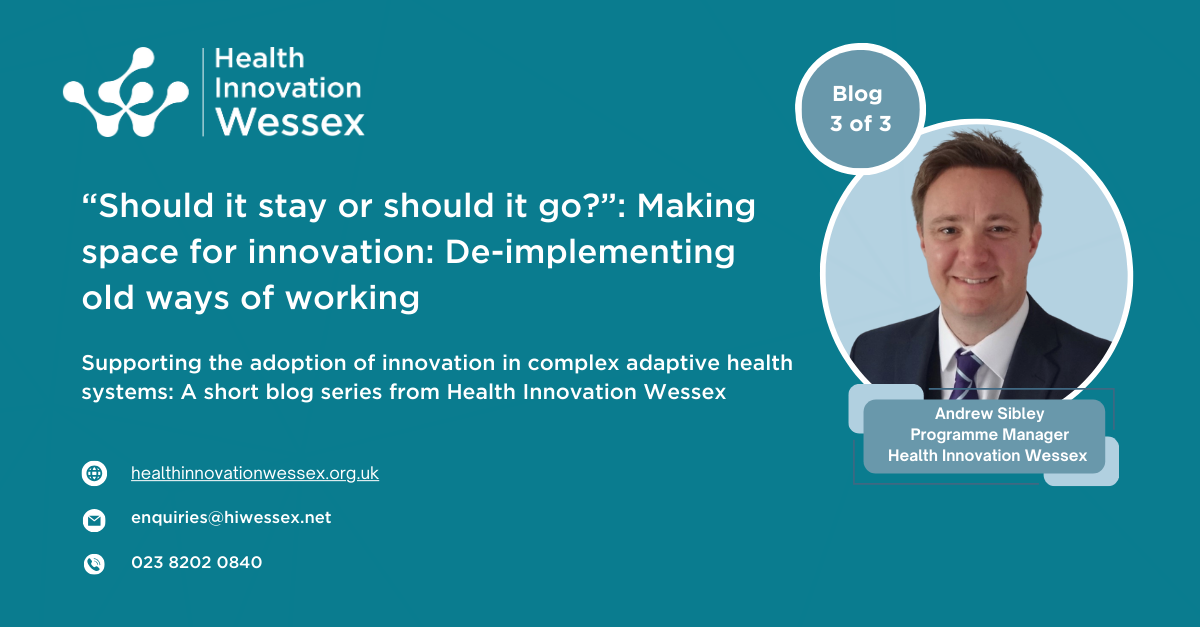Blog
“Should it stay or should it go?” Making space for innovation: De-implementing old ways of working
24 February 2025

Blog
24 February 2025

This blog, the third in our three-part series on supporting the adoption of innovation in complex adaptive health systems, explores how organisations, services and teams can successfully retire old ways of working, this is known as de-implementation.
What is de-implementation?
In the ever-evolving landscape of healthcare, the focus has traditionally been on implementing new innovations to improve patient outcomes. However, an equally important, yet often overlooked, aspect is de-implementation – the process of discontinuing practices that are ineffective, outdated, or potentially harmful.
According to research definitions, de-implementation is the systematic process of stopping the use of medical practices, interventions, or policies that are no longer supported by evidence, are less effective than alternatives, or are harmful. For NHS managers and staff, this can be complex and they face – to paraphrase the 80s band The Clash – making decisions about ‘should it stay or should it go?’
Decisions on stopping out of date practices are crucial to ensure that healthcare resources are used efficiently and that patients receive the best possible care.
De-implementation may not mean a ‘hard stop’
There are several shades of grey to consider. The care pathway or device currently operating may only be reduced, rather than removed. For instance, changing the screening age from 50 to 65 years old or only using a pathway with a specific sub-group of patients. Complete removal of a service or pathway is possible, but it is more likely that phased removal is the safer or preferred option.
Stopping old ways of working is hard for individuals and organisations
The experience of Health Innovation Wessex (HIW) in supporting the adoption of innovation has shown that success is often dependent on stopping outdated interventions, procedures or processes that are removed or replaced by an innovation. However, challenges can arise in stopping these old practices, even when there are clear reasons to do so.
A practical model to support de-implementation
HIW have identified a lack of practical guidance to support de-implementation in health and care, yet there is a pressing need for this if we are to improve patient outcomes. A review of de-implementation research models and frameworks led to the creation of the HIW practical model. Once a decision has been made about what to stop, the model recommends a series of activities to support effective de-implementation:
The practical model has been developed for experienced innovation adoption managers, to guide their support of staff engaged in change.
Enhancing the efficiency of de-implementation activities
Optimising de-implementation is achievable by using a practical model to identify barriers and assess the impact of decommissioning. This approach can mitigate risks and reduce unnecessary tasks for NHS staff. Additionally, it can ensure NHS staff are well-informed about the research-based steps necessary for successful de-implementation. The activities outlined in the model will support NHS staff in achieving a smooth transition away from decommissioned services, practices, and devices.
Further information
Blog author: Andrew Sibley, Programme Manager, Health Innovation Wessex: andrew.sibley@hiwessex.net
Interested in how our model can help you or your organisation to adopt innovation more efficiently and improve care? For an informal conversation, please contact Health Innovation Wessex at enquiries@hiwessex.net or message us via LinkedIn.
Share
Need more information?
Contact the communications team:
(023) 8202 0858